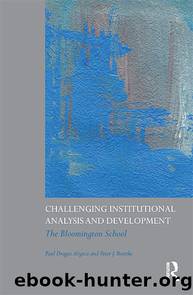Challenging Institutional Analysis and Development: The Bloomington School by Paul Dragos Aligica & Peter J. Boettke

Author:Paul Dragos Aligica & Peter J. Boettke [Aligica, Paul Dragos & Boettke, Peter J.]
Language: eng
Format: epub
Tags: Public Affairs & Administration, Comparative Politics, Political Science, American Government, General
ISBN: 9781135968533
Google: beqSAgAAQBAJ
Goodreads: 17530659
Publisher: Routledge
Published: 2009-06-02T00:00:00+00:00
The emerging grand picture is one in which societies are constituted by the simultaneous operation of several institutional levels, shaped by experiments inspired by various types of ideas. That gives a fresh meaning to the notion that social order consists of complex systems of knowledge processes.
The focus on the type of knowledge relevant to the constitutive and institutional choices and the recognition of diverse levels and dynamics of human interactions introduces the notion of different levels of analysis, a notion specific to the Bloomington School. The levels correspond to levels of decision making regarding specific institutional structures (E. Ostrom et al. 1994, 46; Crawford and Ostrom 1995; E. Ostrom 2005; 1982). Three key levels are identified (Kiser and Ostrom 1982): (1) Operational level, the level of day-to-day decisions made by the participants in any institutional setting; (2) Collective-choice level, the level determining the operational activities and results through specific, domain-focused institutional and organizational structures and operational rules, and (3) Constitutional-choice level, the level that defines the broad parameters of social action and social order creating the foundations for the institutional arrangements and the rules to be used in crafting the set of collective-choice rules that in turn affect the set of operational rules (E. Ostrom et al. 1994). For each level, specific formal and informal institutional and organizational arrangements emerge to facilitate the coordination and cooperation of actors. But the emergence of these settings is rarely a matter of pure accident or the result of deterministic forces. The way they are defined and constructed requires human intelligence, deliberation and artisanship (E. Ostrom 1998, 8).
The arrangements of each level are a response to the challenges and problems of each corresponding arena and require specific and articulated ideas about their organization, structure and functioning. One could see why ideas about the institutions and the understanding of the institutional processes become vital. Following closely the Institutional Analysis and Development framework, one could classify these ideas into three categories, corresponding to the three levels. First, the operational level ideas: ideas about the day-to-day decisions made by the social actors, ideas about social and technological processes, and about the most common rules and institutional arrangements of production and exchange. Second, the collective-choice level ideas: ideas about the parameters of the operational decision, ideas about the immediate institutions and rules encapsulating the operational activities. For instance, these are ideas about the specific rules to be used in changing operational rules, the nature of specific organizational arrangements, the procedures and acceptable parameters of institutional change and in general about the social technology governing the operational level. Finally, the constitutional-choice or constitutive level ideas: ideas that define the meta-level creating a broad conceptual and normative framework within which interactions and institutions are to develop. They are crucial in determining the legitimacy of actors and the rules to be used in crafting the set of collective-choice rules which, in turn, affect the set of operational rules. Constitutive or constitutional ideas are the ultimate framework, the code of operation as well as the source of meaning of a social system.
Download
This site does not store any files on its server. We only index and link to content provided by other sites. Please contact the content providers to delete copyright contents if any and email us, we'll remove relevant links or contents immediately.
The Secret History by Donna Tartt(19088)
The Social Justice Warrior Handbook by Lisa De Pasquale(12190)
Thirteen Reasons Why by Jay Asher(8909)
This Is How You Lose Her by Junot Diaz(6886)
Weapons of Math Destruction by Cathy O'Neil(6279)
Zero to One by Peter Thiel(5802)
Beartown by Fredrik Backman(5754)
The Myth of the Strong Leader by Archie Brown(5507)
The Fire Next Time by James Baldwin(5444)
How Democracies Die by Steven Levitsky & Daniel Ziblatt(5218)
Promise Me, Dad by Joe Biden(5153)
Stone's Rules by Roger Stone(5088)
A Higher Loyalty: Truth, Lies, and Leadership by James Comey(4963)
100 Deadly Skills by Clint Emerson(4925)
Rise and Kill First by Ronen Bergman(4788)
Secrecy World by Jake Bernstein(4753)
The David Icke Guide to the Global Conspiracy (and how to end it) by David Icke(4718)
The Farm by Tom Rob Smith(4509)
The Doomsday Machine by Daniel Ellsberg(4490)
